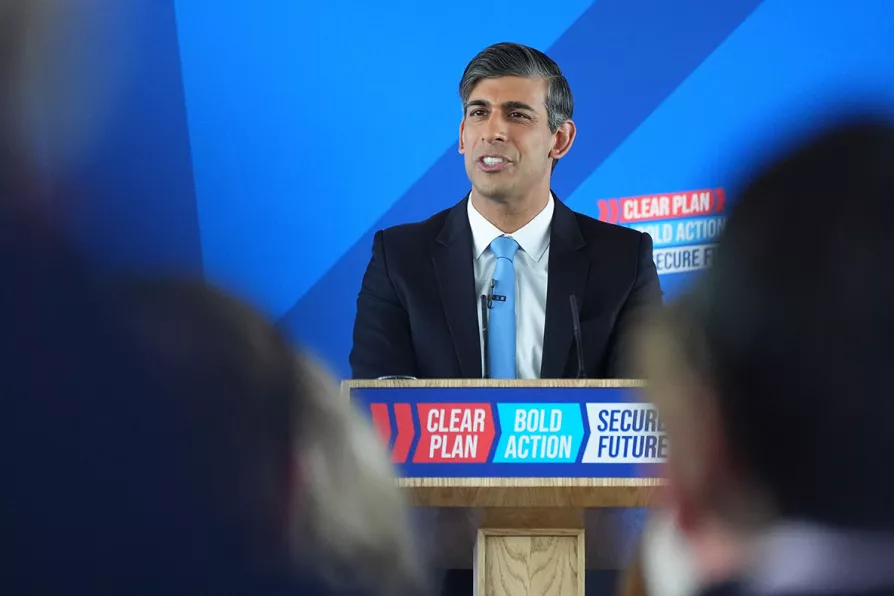
 Prime Minister Rishi Sunak launches the Conservative Party General Election manifesto at Silverstone in Towcester, Northamptonshire, June 11, 2024
Prime Minister Rishi Sunak launches the Conservative Party General Election manifesto at Silverstone in Towcester, Northamptonshire, June 11, 2024
DESPERATE Rishi Sunak unveiled a hard-right Tory manifesto today as he comes under mounting pressure from Nigel Farage’s Reform party.
Key Conservative pledges in their prolong-the-agony programme include further cuts to National Insurance, anti-migrant measures, a dilution of net-zero plans and a still more severe clampdown on the right to protest.
Having earlier admitted that the government had failed on housing, Mr Sunak offered a stamp duty cut for first-time buyers, with tax breaks for landlords who sell to tenants.
He said 2p is to be cut from National Insurance, bringing it down to 6 per cent, half the rate of a year ago, and it will be abolished altogether over the next five years for the self-employed, in the unlikely event of Tory re-election.
Mr Sunak has stated he wants to scrap National Insurance altogether.
The Tories will aim to halve immigration and bring it down every single year, with renewed commitment to the Rwanda deportation scheme — so far an expensive flop — a centrepiece.
The manifesto reaffirms proposals already announced for the reintroduction of national service and for a huge increase in military spending.
However, the Prime Minister has not committed to withdrawing from the European Convention on Human Rights, a key demand of the party’s far right, opposed by much of the Cabinet.
Instead he stuck with the ambiguous formulation that “if we are forced to choose between our security and the jurisdiction of a foreign court, including the ECHR, we will always choose our security.”
The Tory right have threatened to launch their own nationalist populist manifesto if Mr Sunak fails to gain much public traction and ameliorate the Conservatives’ terrible poll ratings.
They can be consoled that the rich will get richer under the plan unveiled today. An analysis by the independent Resolution Foundation think tank showed that the big winners from tax reductions totalling more than £17 billion a year will be the top 20 per cent of households.
It added that the Tory plans also imply a £21bn cut to government departments other than health, education and defence.
Poverty only got a fleeting mention in the manifesto, and Alison Garnham of the Child Poverty Action Group warned that “reducing entitlements to disability benefits and increasing sanctions in our social security system will make some of the worst-off families even more insecure.”
In a startling piece of political positioning, Labour took aim at the Tory manifesto from the right. Campaign chief Pat McFadden slammed it for being “stuffed full of unfunded spending commitments.
“The Prime Minister that was brought in to be the antidote to the chaos of Liz Truss has instead become the next instalment of the same thing.
“The public is still paying the price of the Conservatives crashing the economy. Now they promise a repeat if they win again leading to higher mortgages and a weaker economy.”
His boss went still further, with a cynical attempt to compare the Tory plans to the Labour manifestos under Jeremy Corbyn, which Sir Keir Starmer uncomplainingly championed at the time.
“They’re building a sort of Jeremy Corbyn-style manifesto where anything you want can go in it, and none of it is costed. Load everything into the wheelbarrow, don’t provide the funding, and hope nobody notices the money isn't there,” Sir Keir claimed hypocritically.
Campaign group Momentum pointed out that “Labour’s 2019 manifesto was fully costed. Keir should know, he stood on it as a member of the shadow cabinet,” adding that the Labour leader should stop “attacking your own side during an election.”
TUC president and firefighters’ union leader Matt Wrack slammed the manifesto as “a further declaration of war on trade unions and workers’ rights” with its pledge to implement the strike-busting minimum services law recently introduced but so far unused.
“It’s outrageous that the Tories are planning to continue to use this highly authoritarian and dictatorial law to attack trade unions if they are re-elected,” he said.














